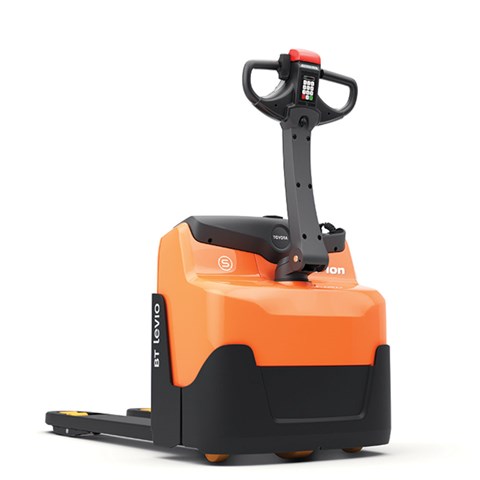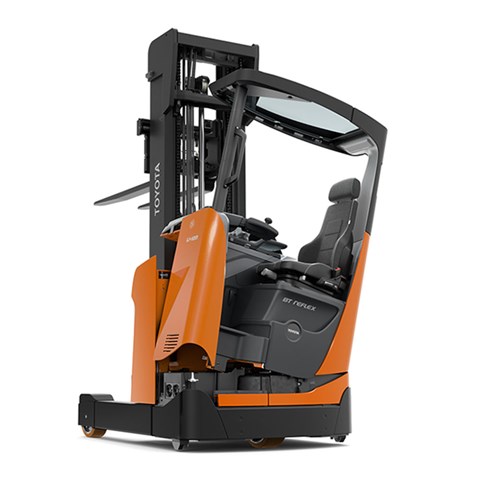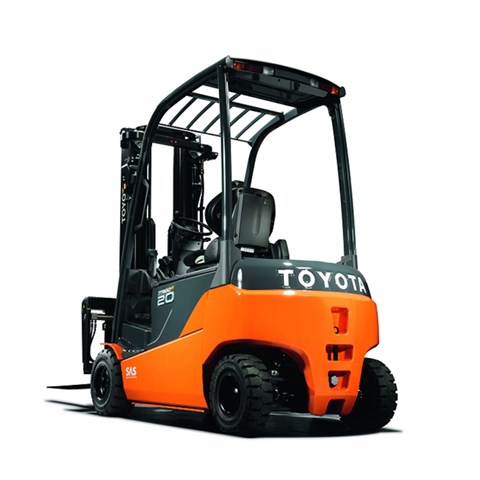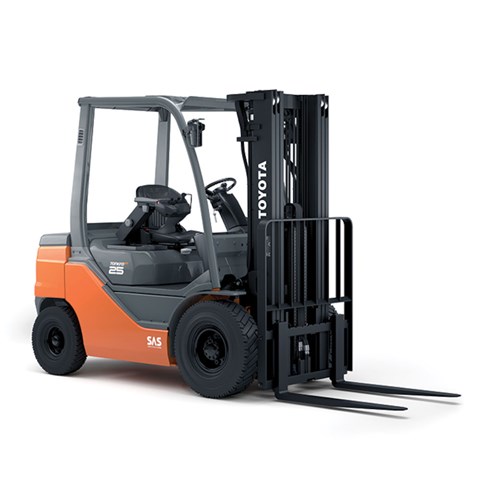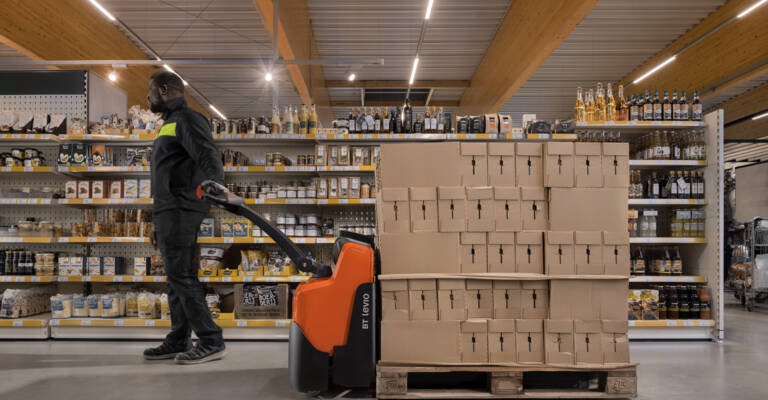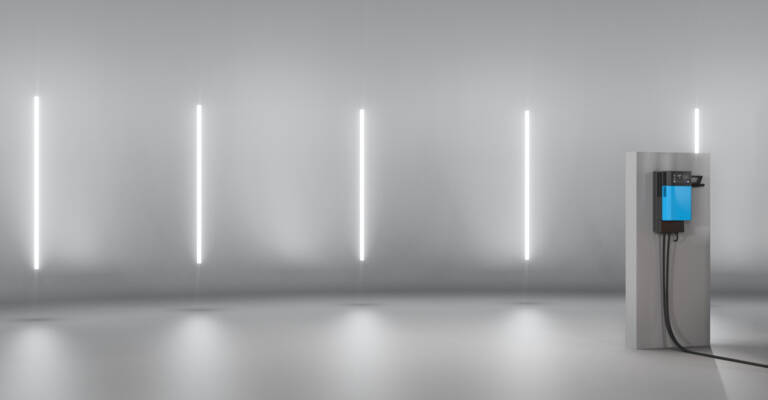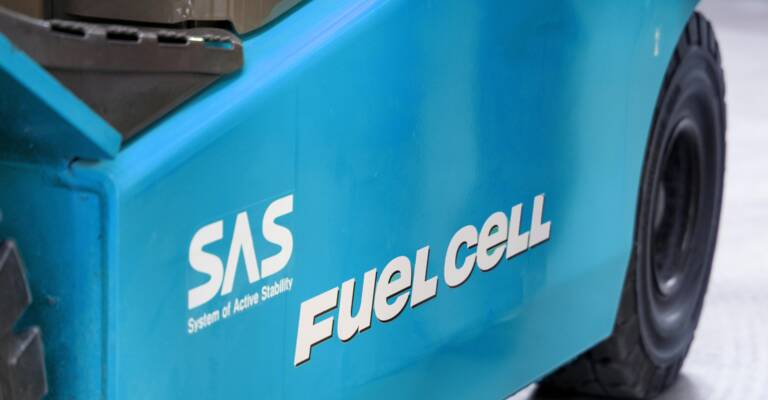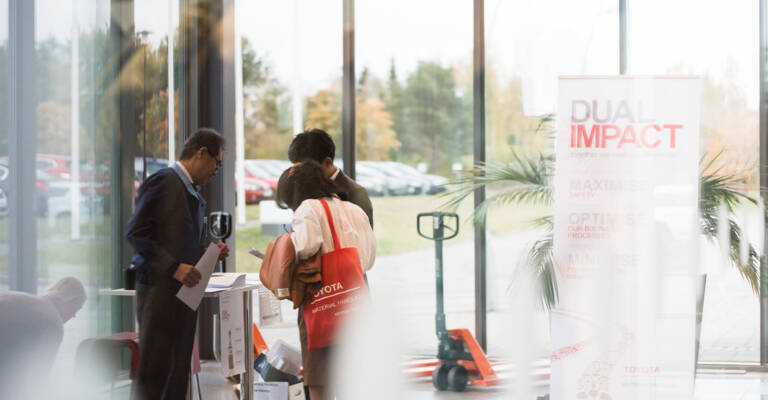Find the right energy solution for your operation
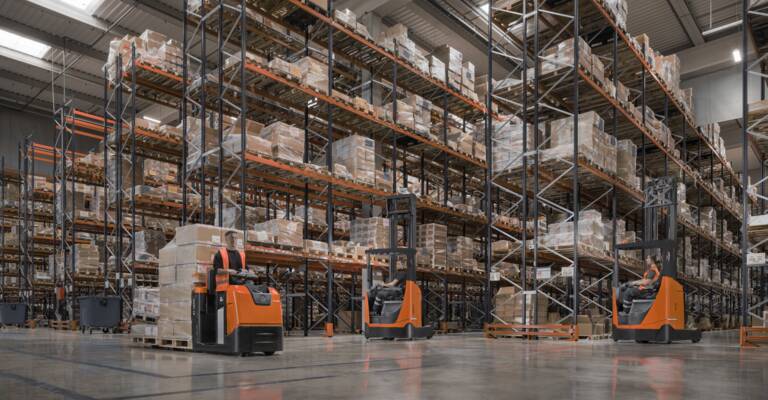
Our energy solutions can help you:
- Enjoy a leaner operation without trucks standing still due to low battery
- Cut back on your energy usage and emissions
- Reduce operational costs
- Optimise space
- Improve truck uptime
- Streamline production timescales
- Experience an easy, safe, and efficient energy solution, with no compromise
What energy source is right for my forklift trucks?
Even though lead-acid batteries have been the common energy source for forklift trucks for several years, Toyota Material Handling pioneered the use of lithium-ion batteries as an option back in 2013. Since then, it has quickly become a primary power source for forklifts. Both lithium-ion and hydrogen energy sources help companies reach their sustainability goals, since they utilise less energy than traditional lead-acid batteries.
Selecting the right energy option for your forklift fleet depends on your business priorities. The table below compares some of the most common options:
Lithium-ion
Time to fully charge: 80 min
Charging Infrastructure: None, charges on your electricity network
Maintenance: None
Life cycle: 5,000 charging cycles
Emissions: None (combined with green electricity)
Availability: Full electric range
Fuel cell
Time to fully charge: 3 min
Charging Infrastructure: Fuel station and optional electrolyser
Maintenance: Minimal
Life cycle: 10 years
Emissions: None (combined with green hydrogen)
Availability: 90% of electric range
Lead-acid
Time to fully charge: 8-12 hours
Charging Infrastructure: Separate charging room
Maintenance: Intense: regular water topping
Life cycle: 1,500 charging cycles
Emissions: Chemicals during charging
Availability: Full electric range
Lithium-ion
Fuel cell
Lead-acid
How can lithium-ion batteries support my forklift operation?
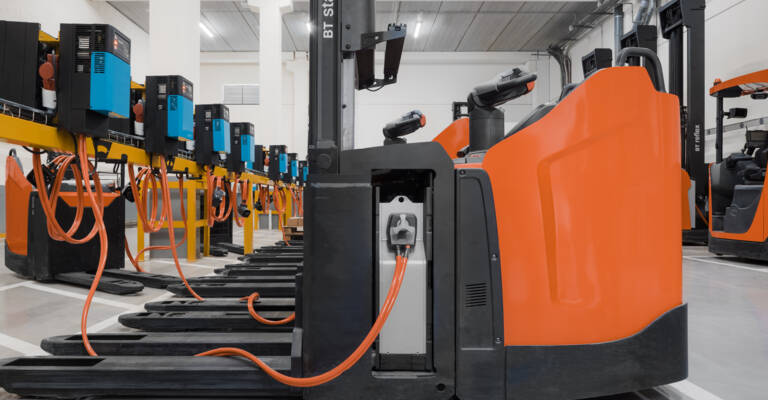
Efficient, flexible charging
Lithium-ion is the most efficient energy solution available. Highly suited to both single and multi-shift environments, it is easier and faster to charge than lead-acid and allows opportunity charging. This eliminates the need to change batteries during the day, maximising overall forklift productivity rates.
Smart chargers keep costs under control
We offer our own in-house assembled lithium-ion batteries, with different capacities across the range. Depending on your needs, utilisation rates, application, and energy infrastructure, we match the right battery with the right charger. All our smart chargers have Dynamic Power Limitations, which manages their overall energy usage, avoiding costly ‘peaks’ in demand. When charging several trucks at the same time, the chargers will send the most power to the truck that has the lowest battery left. This shortens charging time and improves the energy efficiency of the process by up to 15%.
Benefits of lithium-ion batteries
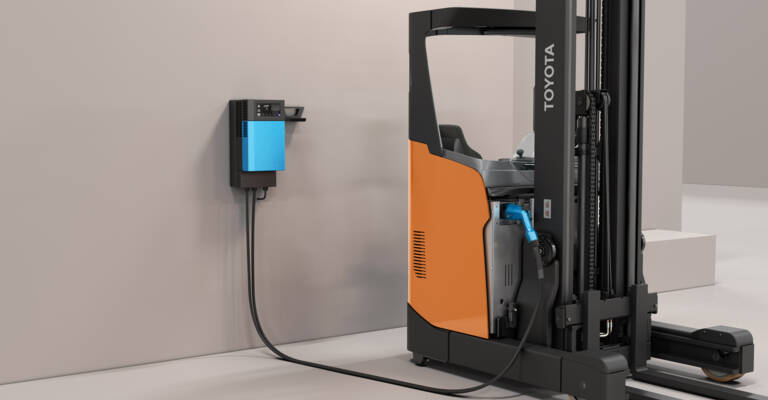
Lithium-ion is safe, efficient, and reliable. Some of the benefits include:
- More than three times the lifecycle of lead-acid batteries
- 30% more energy-efficient than lead-acid
- Seven-year warranty and battery capacity warranty from Toyota
- Improved safety due to the unique Toyota charging plug
- Opportunity charging possible
- Easy and fast charging: fully charged in only 80 minutes (30mins charging for 50% battery capacity)
- No battery servicing required
- No emissions when green electricity is used
- Available on all our electric trucks
How can fuel cells support my forklift operation?
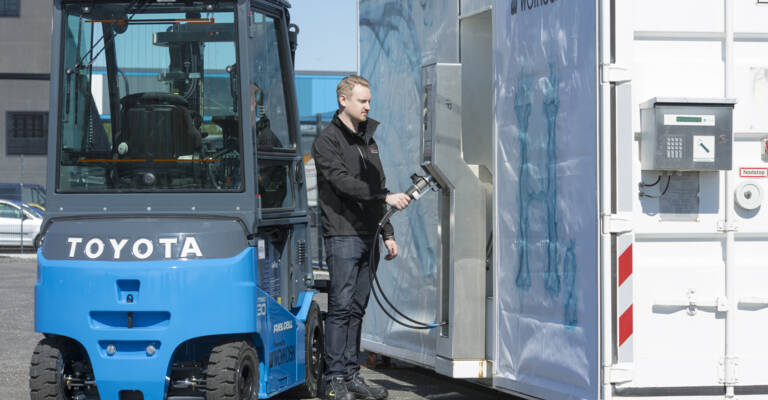
Rapid, low-emissions charging
If you manage a heavy-duty application or an intense multi-shift operation where opportunity charging isn’t possible, fuel cell is the right way to go. Fuelling and charging is both easy and rapid for fuel cell-powered trucks, while reducing your CO2 impact.
Water is the only waste product
Fuel cells generate electricity when hydrogen meets oxygen in the electrolysis process, driving the electric motor and generating water as a waste product. Hydrogen made with renewable energy is completely carbon-free. When turning it into electricity, the only emission is distilled water. Hydrogen can be easily stored and transported, enabling renewable energy sources to be used to their full potential.
Benefits of fuel cell solutions
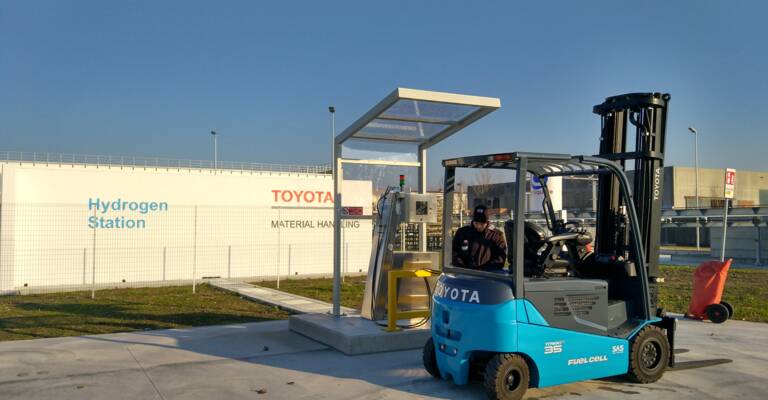
Fuel cell is beneficial for complex, large fleets with multiple shifts where battery exchange is needed. Some benefits:
- CO2 emissions-free
- Refuelling in only 1-3 minutes, saving time
- Flexible: additional fuelling is always possible without harming the battery life cycle
- High energy density
- Easy to store and transport
- No performance loss, even when the tank is almost empty
- Low maintenance
- Can be retrofitted into existing equipment
- Available on 90% of our electric trucks
How can lead-acid batteries support my forklift operation?
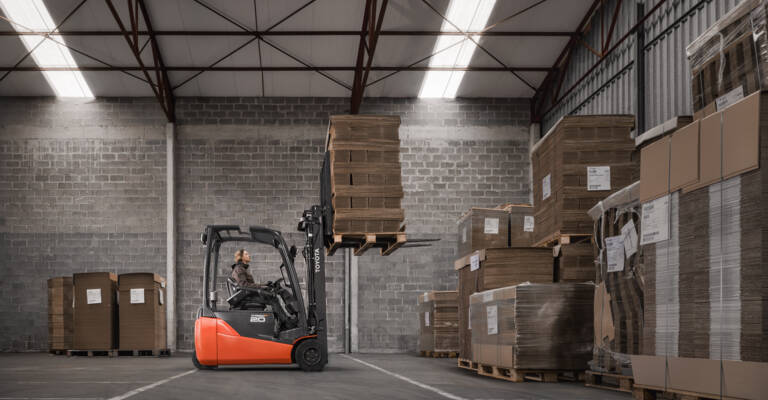
Regular, cost-effective charging
While lead-acid batteries have the lowest initial cost, they do require regular maintenance to remain in peak condition. The batteries require a separate charging room and take 8-12 hours to be fully charged. The battery also requires water top-ups regularly. Lead-acid has 1,500 charging cycles and these batteries are best charged when they are around 20%.
Benefits of lead-acid batteries
Lead-acid is great for a simplistic logistics process with circular economy principles.
- Cost-effective
- 98% recyclable
- Tried and tested technology
- Available on most of our electric trucks
How can combustion engines support my forklift operation?
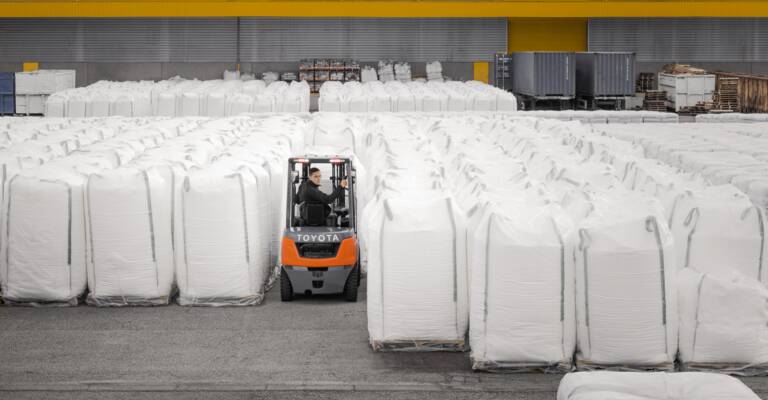
A truck with an internal combustion engine has a lower initial cost compared to an electric truck. Engine-powered trucks are suitable for outdoor applications and operate well in unfavourable weather such as rain. To be used inside, your operation requires a sufficient ventilation system in the operating environment to handle exhaust emissions. Internal combustion engines don’t require any charging time and are easy and quick to refuel if the infrastructure for refuelling is available.
Toyota’s counterbalanced internal combustion range surpasses the latest European stage V regulations for emissions and is available with two different fuel options: diesel and LPG, with lift capacity up to eight tonnes.
Benefits of engine-powered forklifts
Ideal for outdoor tasks, internal combustion engines offer several benefits:
- Efficient and long run time between refuelling
- Low initial cost
- Fast refuelling for LPG tanks
- Suitable for outdoor applications
Know and go
Did you find the right energy solution for you? Now let’s match it with the truck model suitable for your business. Below four common vehicle types to help you get started with your choice.
Compact, light and agile
- Highly energy-efficient
- Easy to manoeuver
- Ideal for confined spaces
- Built around Li-ion
Recommendations:
Toyota BT Levio LWI160 is a powered warehouse truck ideal for working in confined spaces such as retail sales areas, shops and supermarkets.
Productive and comfortable
- Proven innovation
- Ergonomic operator compartment
- Lifting capacity up to 13 m
- With intelligent li-ion energy packs
Recommendations:
Our reach truck range is wide and can support many different applications: indoor, outdoor and in confined spaces.
Efficient indoor and outdoor
- High manoeuvrability
- Available in 3 & 4-wheel version
- Armrest with fingertip control
- Available with Li-ion
Recommendations:
The Traigo 48 models are very energy-efficient, come with excellent all-round visibility and high lifting and driving performance.
Durable, powerful and reliable
- Outdoor use
- Uneven floor
- Torque converter or HST transmission
- Available with LPG or Diesel
Recommendations:
The Tonero range from 1.5 to 8.0 tonnes comes with powerful and reliable Toyota industrial engines delivering unmatched power and stability.
Get battery insights from I_Site
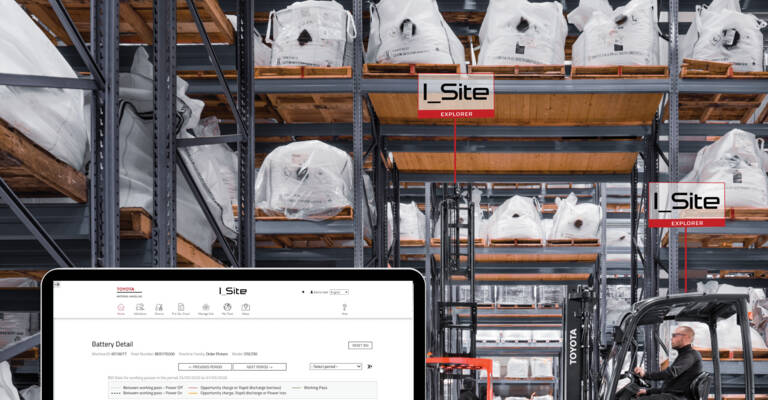
Lithium-ion batteries present new opportunities for more flexible charging. Unlike lead-acid battery alternatives, the life expectancy of lithium-ion is not affected by charging frequency. In fact, opportunity charging is actively encouraged to maintain the uptime of operations. Using I_Site Explorer, it is possible to track your battery charge levels and ensure they are always charged to optimum levels. Charging a truck while it is idle will allow you to use fewer batteries and minimise the risk of suffering unplanned downtime.
Got any more questions about lithium-ion batteries for forklifts? Visit our FAQ page here>>
Our energy commitment
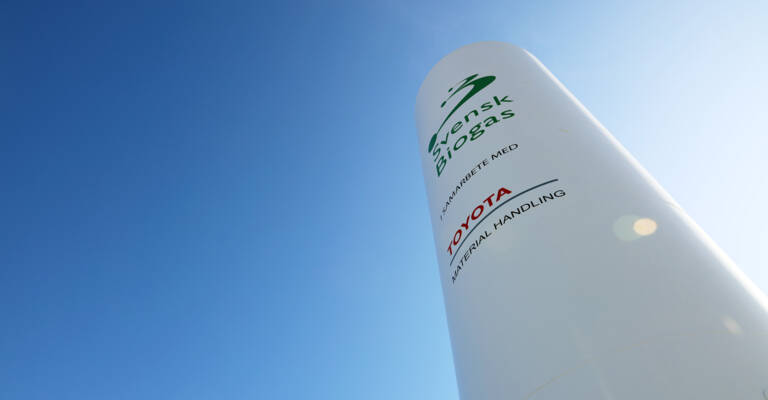
Our company vision is zero muda (meaning zero waste) in everything that we do. This is also shown in our energy approach. We have committed to being carbon-free by 2030 within our own operations.
To achieve this promise, we have set up an energy policy based on 3 pillars and targets for 2030:
- Net zero emissions from our own operations
- Mapping emissions in our supply chain and partnering with suppliers to develop low-carbon alternatives
- Developing a full product range of zero-carbon products and solutions
Since August 2019, Toyota Material Handling Sweden has been recognised as our first carbon-free factory, emitting zero CO2, and using only green electricity, district heating and liquid biogas.
Read more about Toyota Material Handling’s sustainability approach in Europe>>
Find out more about solar power as an energy solution to power your forklift fleet efficiently>>

